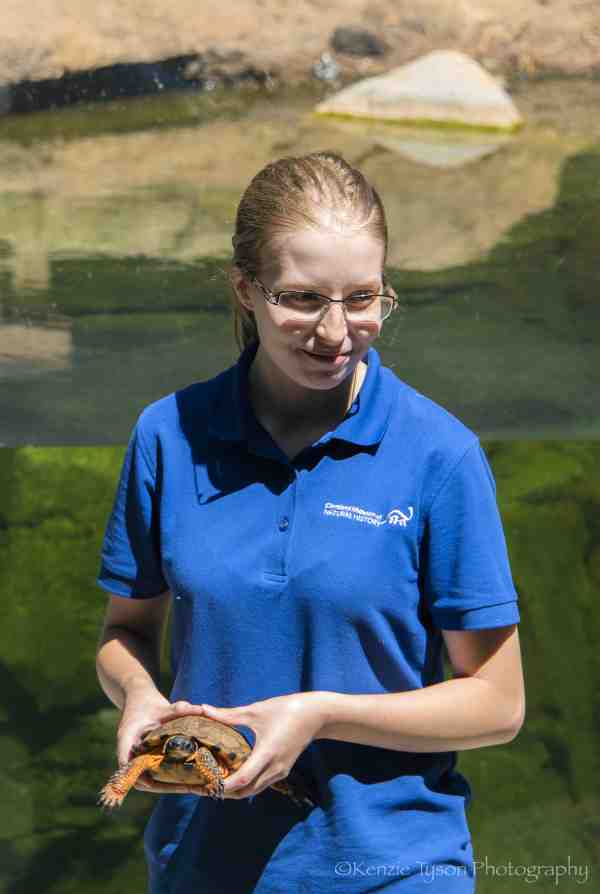Rebecca Oliphant '23, Zoo and Wildlife Biology
Rebecca Oliphant ‘23 was drawn to Malone because of the Zoo and Wildlife Biology program.
“Malone is close to my home in Cleveland, and in the zoo you get hands-on experience with the animals,” said Oliphant, who has risen the ranks to be one of the mammal team leads at the Malone Zoo. “I also like that Malone is a smaller school. I like the individualized attention that I receive, and how my professors know me and I can have a relationship with them.”

As a Zoo and Wildlife Biology major with an Environmental Science and honors minor, Oliphant likes to see how everything works together in biology.
“I love my classes where I get to learn about animals and the environment. I like to get down in the nitty-gritty sometimes, but I also enjoy talking about the broad way everything fits together,” she said. “Vertebrate biology, invertebrate biology, and comparative biology have been some of my favorite classes.”
This passion for animals and the big picture of biology was always something Oliphant felt inclined to study.
“Part of me always knew that I would end up in this field, but I didn’t formally accept it and think about it until I was almost in college,” she said. “I came to Malone at 17 and felt like I would never be able to do something without zoo and wildlife biology as a part of my life. It feels like a no-brainer now, but it wasn’t really in my head as a reality until then.”
As she began to look into internships for the summer, it was another no-brainer for Oliphant to stay close to home at an organization she had loved her whole life.
“I was excited to serve as a Kirtlandia Wildlife Research Intern at the Cleveland Museum of Natural History. I could have worked with otters or some coyotes, but I chose turtles,” said Oliphant. “Jim, my supervisor, came to me and told me about a public project they wanted to do with turtles, and that just clicked for me. I really wanted to talk to the public and interact with guests directly which is something I really enjoyed doing.”
Oliphant admits that while some people in her field may prefer to work only with animals, she sees a bigger picture.
“If I can’t share my passion about animals, what's the point? That active role was important to me,” she said. “I’ve always had an inclination towards turtles, or really anything I’ve ever had as a pet. I have a turtle, a red-eared slider, and he’s been my baby since I was about 11 years old. I’ve always liked aquatic turtles and knew a lot about them so I wouldn’t need a ton of training to talk to guests.”
Oliphant worked with a wide swath of turtle species, and helped the public reconsider many turtle misconceptions.
“I worked with multiple species; three eastern woodland box turtles, a common snapping turtle, a map turtle, a painted turtle, and an endangered wood turtle. Our public programs let people get close to the animals and learn more about them,” she said. “People will go and pick up turtles in the wild and take them home, or they will find a turtle and take them to a random lake or something like that. A lot of people don’t realize that turtles aren’t just out and about for fun, they know where they’re going and what they’re doing. So it’s good to educate people and help them experience something they haven’t experienced before.”
In addition to working with the turtles, Oliphant gained more experience in all areas of animal care.
“I was trained on a lot of animals - the turtles were essentially my specialized side research. I also worked with a variety of species doing diets, feeding, and cleaning their cages. But I’ve noticed that what some people would consider ‘gross’ doesn’t bother me. It’s all necessary for animal care.”
There were a combination of classes that prepared Oliphant to succeed in this role, both with the animals and with the general public.
“Obviously all of my biology classes were really helpful. Anytime I had to talk to people I had to know what I was talking about; more than just knowing facts, but feeling confident in my explanation and delivery of care,” she said. “My communications class helped me with talking in front of people, and even my statistics class helped me understand charts and data that we encountered in the museum.”
While her Malone education has given her a foundation to succeed in traditional animal care, Oliphant sees a unique path in the future.
“I think I’m going to take a break after graduation and go to carpentry school so that someday I can do exhibit design. My degree at Malone gave me the knowledge of animal natural history and care, and this next step will allow me to build and design the best habitats for animals,” she said. “Exhibit design is everything to an animal; they are totally reliant on the people who care for them in captivity. Often animals don’t have enough space or the right type of space, and this can affect the public’s perception of an animal. I want to utilize available space in order to give animals the appropriate amount of space that they need to thrive.”
